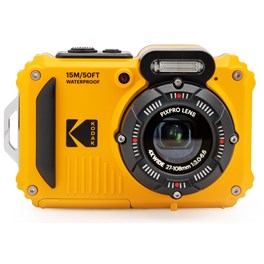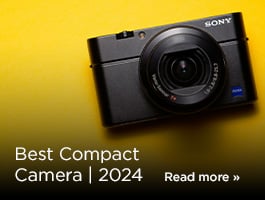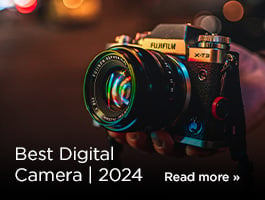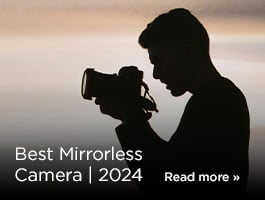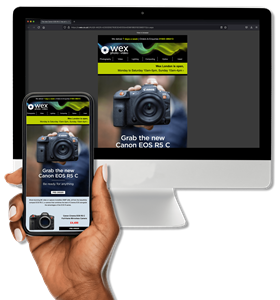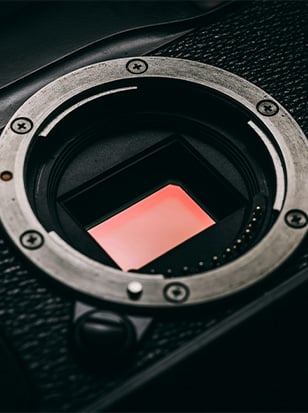
Thanks to the best cameras for kids, you can encourage and nurture a child’s interest in image-making. While smartphone cameras are of course ubiquitous nowadays, a dedicated camera is the ideal way to help a kid understand a little more about how pictures work, and how to take a good one.
What better way is there to help impressionable tiny people with a keen interest in photography to learn about the topic than to let them experiment with rudimentary cameras? Getting hands-on with these cameras will help kids understand how a camera works at its basic level — and, as a bonus, they are super fun to use.
We have included film cameras, instant print cameras and digital cameras for kids of all ages and interests. If nothing else, it’ll prevent them from playing with your cameras…
Film and instant cameras
While film comes with ongoing costs, it’s simply unmatched in terms of the kinds of tactile fun kids can have with it. Whether you choose instant film or more traditional negative film, you can use these cameras to teach kids the basics of the relationship between the camera and the image. And in terms of making memories to keep for life, nothing beats a gorgeous physical print of a film image.
Fujifilm Instax Mini 12 Instant Film Camera - Pastel Blue
Get unique and long-lasting keepsakes in seconds with the Fujifilm INSTAX Mini 12 Instant Film Camera. With a distinctive bubbly design, automatic exposure and flash control, and a handy selfie mirror, this camera lets you capture life's special moments however and wherever you want. Whether taking a group photo or snapping a selfie, the INSTAX Mini 12 is a great everyday companion.
£79.00 View
Pros:
- Very simple to operate
- Prints are near instant
- Selfie mirror
Cons:
- Prints are quite small
The Instax Mini is an obvious choice for kids. It is small, cute, and doesn’t require that much supervision. It is straightforward to use, although the adult should probably load the film before handing it over. The results are immediate — the shutter button is pressed, and moments later, a tactile print comes out that can be pinned to boards or stuck to scrapbooks. The exposures are completely automated, so there’s no danger of wasting film through using the wrong settings, and the camera even has a selfie mirror.
Film for Fujifilm Instax Mini cameras can be bought in colour or monochrome flavours — kids will likely prefer colour but you can always mix and match.
Polaroid Now Gen II Instant Camera - Red
The iconic Polaroid analogue camera is even more user-friendly and selfie-ready with the Polaroid Now Gen II Instant Camera. With an improved human-friendly flash, a self-timer, and a double-exposure option, the Gen II is designed with you in mind. Now made with 40% recycled materials, the internal lithium-ion battery is also USB-C compatible, making it easy to charge and go whenever you like.
£119.00 View
Pros:
- Gorgeous instant film images
- Portable and convenient
- Larger prints than Instax
Cons:
- Film more expensive than Instax
- May be complex for really little kids
Polaroid has been steadily refining its instant film camera offering since the brand’s reinvention at the hands of the Impossible Project. The Polaroid Now Gen II Instant Camera is the best yet, and while its various shooting modes and settings controls mean it might be a little complex for very small teens, it’s an ideal choice for tweens and teens who want to get to grips with a camera and still have fun.
It’s compatible with the latest I-type film — available in colour or black and white — and these make classically sized Polaroid prints with all the lo-fi charm you remember them having. They do cost more per shot than Instax, which again makes the Polaroid a better choice for older kids who might be a bit more judicious with the shutter button. Also, if you have any old Polaroid 600 film kicking around in the loft or the basement, it’ll take that too!
Kodak Fun Flash Single Use Camera 27+12 Exp
The Kodak FUN FLASH Single Use Camera merges convenience with quality, packing 39 exposures into a lightweight, easy-to-use package. It's equipped with Kodak 800 speed film, which captures brighter, more vibrant colours, making it perfect for both indoor and outdoor settings. Whether you're at a party or on holiday, this camera ensures you capture all your photo memories effortlessly.
£19.00 View
Pros:
- Simple to use with no loading or unloading
- Lo-fi charming shots
- 800 speed film does okay in low light
Cons:
- One use only
- Needs to be disposed of responsibly
Remember when a holiday wasn’t complete until your disposable camera pictures had come back from the developers? Why not recreate that magic for your kids with the Kodak Fun Flash Single Use Camera 27+12 Exp — a pre-loaded single-use film camera that’s ready to go with 39 colour shots. The film that’s loaded in has a speed rating of 800 — this means it does a solid job when the light gets low, though you’ll also be helped out there by the built-in flash.
As this is a single-use camera, it’s worth making sure that whoever you send it to for development will dispose of it properly — a good film lab should have a policy in place whereby the parts are either recycled or sent back to the manufacturer for reuse, but it’s always worth checking.
Pros:
- Easy to use and cheap to run
- Produces a physical print and a digital copy
- Can be used to create stickers
Cons:
- Zink prints don’t quite have the je ne sais quoi of instant film
This camera is something of a hybrid. When the shutter is pressed, it produces a digital file that’s saved to a microSD card; however, it also spits out a physical print of the image. It’s not a film print like Instax or Polaroid — the image is printed onto Canon’s Zink (zero-ink) photo paper. While it doesn’t quite have the depth or latitude of film, it is cheaper to buy, and easier to convert into stickers for a kid’s scrapbook (and indeed, Canon sells Zink paper for exactly that purpose).
Most kids will find this camera fairly easy to use, though you may need to set it up for them initially by loading the paper and the microSD card. With no ink cartridges, there’s limited potential for a nasty mess.
Digital Cameras
In this section, we’ve picked out our favourite digital cameras that are suitable for kids. These aren’t “kids’ cameras” per se — they’re designed for adults. But their ease of use and brilliant image quality makes them ideal choices for kids who are just starting to get curious about the process of making pictures and videos.
Pros:
- Great GoPro features at an affordable price
- Small and wearable
- Waterproof and hardy
Cons:
- Complex for young kids
GoPro cameras are brilliant for kids for a number of reasons. Their tough waterproof bodies mean they don’t mind being dropped or submerged; their range of mounting options means they can be used completely hands-free; and their recent updates in stabilisation means that the footage they produce looks better than ever. If you’ve got a kid who’s into extreme or water sports, giving them a GoPro will allow them to capture POV footage to impress their mates with — and that will make you very popular.
The HERO10 is a fairly recent model, but its slashed price makes it a lot more appealing to the camera-buying parents. You will likely need to be on hand to set up the GoPro for your child, but once it’s mounted and recording, they won’t need to do a thing.
Kodak Pixpro WPZ2 Digital Camera - Yellow
The Kodak Pixpro WPZ2 Digital Camera snaps 16-megapixel images and supports 1080p full HD video recording in a rugged, waterproof, and shock-proof casing. Enjoy 4x optical zoom and multiple shooting modes with image stabilisation. Connect to WiFi for effortless sharing and never miss a moment thanks to the rechargeable lithium-ion battery, which can capture up to 2000 shots or 70mins of video.
£159.00 View
Pros:
- Hardy, waterproof body
- Optical zoom lens
- Good battery life
Cons:
- Fairly standard-to-average image quality
- No touchscreen
Another waterproof camera that doesn’t mind being dropped (sensing a theme here?), the Kodak Pixpro WPZ2 makes for a brilliant companion for beach holidays or days by the pool. Coming in a range of colours (white, yellow, red and blue), the WPZ2 has a chunky, easy-to-handle grip and a 4x optical zoom lens. It’s probably not suitable for very little kids, but more advanced ages won’t have a problem (though they might need to get used to the fact that the rear-LCD isn’t a touchscreen).
Battery life lasts well, and the camera offers Full HD movie mode as well as the ability to shoot stills. You can also connect it to your device via Wi-Fi, making it easy for you to offload and save your kids’ creations for them to enjoy later. Or, to embarrass them with a few years down the line. Whatever you prefer!
Canon PowerShot Zoom Essential Kit - Black
This pocket-size super zoom camera offers an expansive 100mm or 400mm focal length, as well as a 2x digital zoom to expand the range to an incredible 800mm. With the capacity to record full-HD video and 12.1 MP still-images, the Canon PowerShot Zoom is ideal for outdoor adventures, wildlife enthusiasts, bird watchers, and family days out. Implements key image stabilisation and USB charging.
£214.00 View
Pros:
- Fantastic for wildlife watching
- Powerful zoom lens
- Super-light and portable
Cons:
- Long zoom can be tricky to use
- More expensive than other option
If you have a kid who can’t get enough of animals and birds, then the Canon PowerShot Zoom could become their new constant companion. It’s a tiny, almost palm-sized digital camera that’s built with a powerful zoom lens inside, allowing for even the most distant subjects to be brought close and captured in photos and videos. While the zoom can be tricky to operate handheld at first, a built-in 4-axis optical stabilisation system makes it a bit easier and more practical to use.
Favoured by wildlife expert Chris Packham, the Canon PowerShot Zoom is ideal for birdwatching. For rambles in the woods, nature hikes and holidays, it’s an excellent camera for your kid to get to grips with.

FAQs
What is the best age to introduce a camera to a child?
Kids can start using a camera around 3 to 5 years old. At this age, they will be more likely to understand basic photography concepts and handle simple point-and-shoot cameras. Look for ones with big buttons and durable designs perfect for their smaller hands.
What features should I look for in a camera for kids?
When picking a camera for kids, durability and ease of use are key. Choose one that's tough, with shockproof and waterproof features to handle drops and spills. Simple controls with large buttons make it easy for kids to use. Fun extras like games, photo effects or video recording can keep them interested and entertained.
Are digital cameras or instant cameras better for kids?
Both have their perks. Digital cameras let kids take lots of photos without worrying about film and often have video and editing features. Instant cameras give the fun of immediate prints, which can be really exciting for kids. It really depends on whether you prefer the versatility of digital or the instant fun of print photos. Either option will help get your kids excited about photography.
How do we decide?
Our in-house photography experts, store staff and partners all work collaboratively to pour over our guides and tips articles. We also consider emerging trends and customer feedback to make sure our guides are always up-to-date and reflective of what people are truly looking for. By curating only the best products, our guides provide trustworthy recommendations, making it easier for customers to make informed choices with confidence.
If you would like more advice on any purchase our contact centre staff are here to help. Alternatively, you can reach us via email or social media. And don't forget. If you were to purchase anything based on our recommendations you'll be covered by our full returns policy



